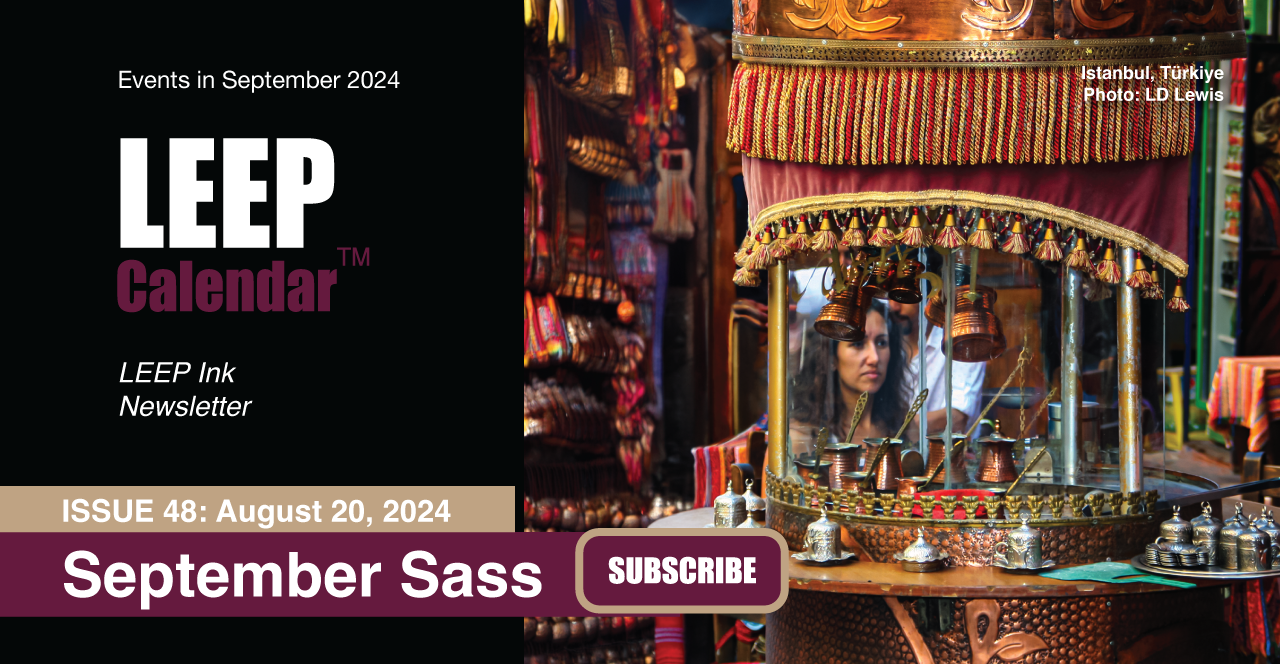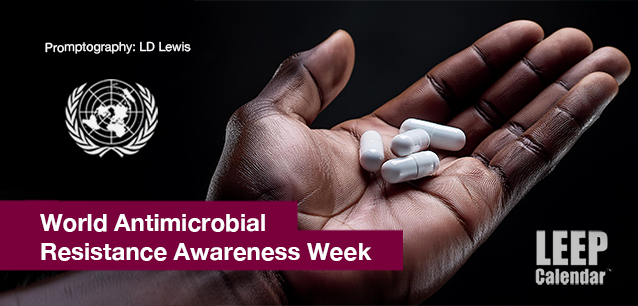 AD
AD
Today is: November 21
Scroll to explore events active on this date.
Additional Events on LEEP
LEEP INK FEATURES

August is Appropos
A toddler playing in the fountain at a park in Santa Fe, New Mexico—Photo LD Lewis. In August, we live through the Dog Days of Summer. It's hot and often humid, and those ...

September is Sassy
Can you hear that sigh of relief from parents worldwide? Yes! September marks the return of students to school, a global phenomenon. Preparations for the ACT and SATs begin earnestly for ...

OOH LA LA, October
October is the busiest month for events, with 5% more happening than in May, the second most eventful month. Sailing enthusiasts will be glued to the finals of this year's Am...
About World Antimicrobial Resistance Awareness Week
Safety & Security , Science & Math
Ends: Nov 24, 2024
DESCRIPTION:
IT'S ABOUT YOUR HEALTH!
WORLD ANTIMICROBIAL RESISTANCE WEEK
World Antimicrobial Resistance Awareness Week (WAAW) is a global campaign led by the World Health Organization (WHO) to raise awareness about antimicrobial resistance (AMR) and encourage best practices among the public, health workers, and policymakers to prevent the further emergence and spread of drug-resistant infections. The campaign takes place annually from November 18 to 24.
HISTORY OF THE EVENT
WAAW began in 2015, following the adoption of a global action plan on antimicrobial resistance by the World Health Assembly in May of the same year. The week-long event promotes understanding of AMR and fosters the implementation of strategies to preserve the efficacy of antimicrobials, which are vital for treating infections in humans, animals, and plants.
Antimicrobial resistance occurs when bacteria, viruses, fungi, and parasites evolve and no longer respond to the drugs designed to kill them. This resistance makes standard treatments ineffective, infections persist, and the risk of spread to others increases. AMR is a natural phenomenon exacerbated by the misuse and overuse of antimicrobials in humans, animals, and agriculture.
TREATING ANTIMICROBIAL RESISTANCE
Treating AMR involves a multifaceted approach, including:
Antibiotic Stewardship
Ensuring the appropriate use of antibiotics by prescribing them only when necessary and in the correct dosages.
Infection Prevention and Control
Implementing hygiene practices, vaccination, and infection control measures in healthcare settings to reduce the spread of resistant infections.
Research and Development
Investing in developing new antibiotics, vaccines, diagnostics, and alternative treatments.
Surveillance and Monitoring
Tracking antibiotic use and resistance patterns to inform treatment guidelines and policies.
IMPORTANCE OF AVOIDING ANTIMICROBIAL RESISTANCE
Avoiding AMR is critical because it:
Preserves Treatment Efficacy
Ensures that antibiotics and other antimicrobials remain effective for treating infections.
Protects Public Health
Reduces the burden of resistant infections, which can lead to prolonged illness, higher medical costs, and increased mortality.
Safeguards Medical Advances
Maintains the effectiveness of antimicrobials necessary for surgeries, cancer treatments, and other medical procedures.
CAUSES AND CONSEQUENCES OF ANTIMICROBIAL RESISTANCE
AMR is primarily caused by:
Overuse and Misuse of Antimicrobials
Excessive and inappropriate use of antibiotics in humans and animals accelerates the development of resistance.
Poor Infection Prevention and Control
Lack of proper hygiene and infection control practices facilitates the spread of resistant microorganisms.
Inadequate Sanitation and Hygiene
Poor sanitation and inadequate infection control in healthcare settings and communities contribute to the spread of resistance.
IF NOTHING CHANGES...
If AMR continues to spread unchecked, the consequences are dire:
Increased Mortality
Resistant infections can lead to more prolonged illnesses and a higher risk of death.
Healthcare Costs
Treating resistant infections is more expensive due to more extended hospital stays, additional tests, and the need for more expensive drugs.
Threat to Global Health Security
AMR undermines progress in modern medicine, making procedures like surgeries and chemotherapy riskier due to the potential for untreatable infections.
World Antimicrobial Resistance Awareness Week serves as a crucial reminder of the collective action needed to combat AMR and safeguard the future of medicine. The global community can work together to address this pressing health challenge through education, prevention, and innovation.
VIDEOS
SUPPORTING DOCUMENTS
Currently, this event does not have supporting documents.
ADDITIONAL IMAGES
Currently, this event does not have supporting images.
Where would you like to go now?
 AD
AD


/footer-logo.svg)
